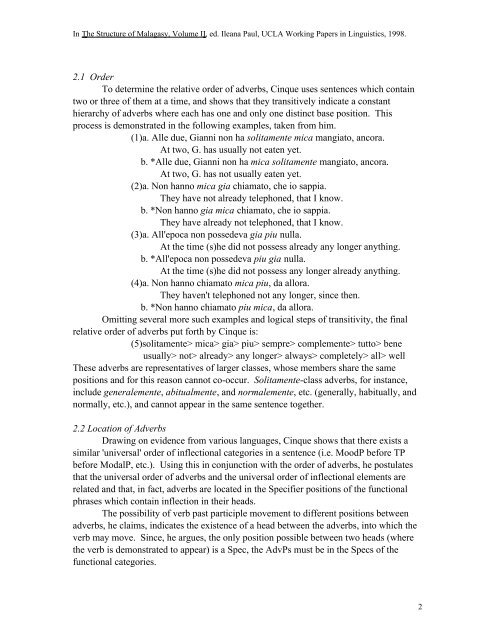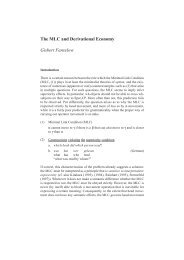Malagasy Adverbs Andrea Rackowski McGill University August 1996
Malagasy Adverbs Andrea Rackowski McGill University August 1996
Malagasy Adverbs Andrea Rackowski McGill University August 1996
You also want an ePaper? Increase the reach of your titles
YUMPU automatically turns print PDFs into web optimized ePapers that Google loves.
In The Structure of <strong>Malagasy</strong>, Volume II , ed. Ileana Paul, UCLA Working Papers in Linguistics, 1998.<br />
2.1 Order<br />
To determine the relative order of adverbs, Cinque uses sentences which contain<br />
two or three of them at a time, and shows that they transitively indicate a constant<br />
hierarchy of adverbs where each has one and only one distinct base position. This<br />
process is demonstrated in the following examples, taken from him.<br />
(1)a. Alle due, Gianni non ha solitamente mica mangiato, ancora.<br />
At two, G. has usually not eaten yet.<br />
b. *Alle due, Gianni non ha mica solitamente mangiato, ancora.<br />
At two, G. has not usually eaten yet.<br />
(2)a. Non hanno mica gia chiamato, che io sappia.<br />
They have not already telephoned, that I know.<br />
b. *Non hanno gia mica chiamato, che io sappia.<br />
They have already not telephoned, that I know.<br />
(3)a. All'epoca non possedeva gia piu nulla.<br />
At the time (s)he did not possess already any longer anything.<br />
b. *All'epoca non possedeva piu gia nulla.<br />
At the time (s)he did not possess any longer already anything.<br />
(4)a. Non hanno chiamato mica piu, da allora.<br />
They haven't telephoned not any longer, since then.<br />
b. *Non hanno chiamato piu mica, da allora.<br />
Omitting several more such examples and logical steps of transitivity, the final<br />
relative order of adverbs put forth by Cinque is:<br />
(5)solitamente> mica> gia> piu> sempre> complemente> tutto> bene<br />
usually> not> already> any longer> always> completely> all> well<br />
These adverbs are representatives of larger classes, whose members share the same<br />
positions and for this reason cannot co-occur. Solitamente-class adverbs, for instance,<br />
include generalemente, abitualmente, and normalemente, etc. (generally, habitually, and<br />
normally, etc.), and cannot appear in the same sentence together.<br />
2.2 Location of <strong>Adverbs</strong><br />
Drawing on evidence from various languages, Cinque shows that there exists a<br />
similar 'universal' order of inflectional categories in a sentence (i.e. MoodP before TP<br />
before ModalP, etc.). Using this in conjunction with the order of adverbs, he postulates<br />
that the universal order of adverbs and the universal order of inflectional elements are<br />
related and that, in fact, adverbs are located in the Specifier positions of the functional<br />
phrases which contain inflection in their heads.<br />
The possibility of verb past participle movement to different positions between<br />
adverbs, he claims, indicates the existence of a head between the adverbs, into which the<br />
verb may move. Since, he argues, the only position possible between two heads (where<br />
the verb is demonstrated to appear) is a Spec, the AdvPs must be in the Specs of the<br />
functional categories.<br />
2
















